Election 2015: Tories 'confident' about £8bn NHS pledge
- Published
Health Secretary Jeremy Hunt says the NHS needs "more money to pay for more doctors and more nurses"
The Conservatives are pledging an extra £8bn a year for the NHS in England by 2020 if they win the election - but Labour says it is an "unfunded" pledge.
The party said it was "absolutely confident" it could fund the five-year plan for the service, drawn up by its boss Simon Stevens last year.
Labour, which is highlighting its own guarantee of one-to-one midwife care, said the Tories were in a panic.
The Lib Dems have also pledged £8bn, funded by scrapping some tax reliefs.
In other election news, Nick Clegg's party is also promising new laws to protect people's rights online including the threat of prison sentences for firms illegally selling personal information.
'Step change'
Last year Mr Stevens, head of NHS England, cited £8bn as the funding gap between what the NHS currently receives and what it needs to implement his modernisation programme.
Speaking on BBC Radio 4's Today programme, Health Secretary Jeremy Hunt said there had been a "step change" in demand for the NHS due to an ageing population, and said the Tories' commitment was "not a blank cheque".
Asked how the Conservatives would fund the pledge, he said the economy had been turned around and pointed to investment in the service during the last Parliament, when the government guaranteed an above-inflation increase in funding.
He said: "If you want to be sceptical about the commitment, look at the track record."
Mr Hunt said the £8bn was in addition to an extra £2bn committed to the NHS at last year's Autumn Statement.
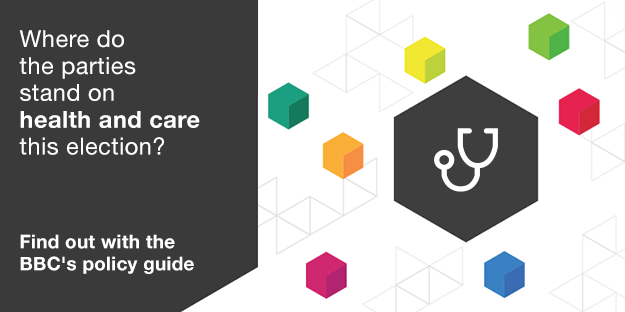
Labour has promised an extra £2.5bn a year for the NHS, to be paid for by a tax on homes worth £2m or more, a levy on the sales of tobacco companies and curbing what it says are tax breaks enjoyed by hedge funds and other finance firms.
Labour leader Ed Miliband, speaking at Labour's health manifesto launch in West Yorkshire, said: "The choice is clear: a funded Labour plan for more doctors, nurses and midwives or unfunded promises from a Tory party that has a record of breaking its word.
"The bottom line is this: you can't fund the NHS from an IOU. And the British people know it."

Analysis by BBC Political Correspondent Iain Watson
Labour leader Ed Miliband: "You can't fund the NHS with an IOU"
Ed Miliband has resisted the temptation to say he would do whatever it takes to find the cash to match the Conservative's £8bn NHS pledge, arguing that it is unfunded.
But privately I detect that some senior Labour figures are concerned about being outbid on NHS spending. The Lib Dems are saying they would cough up an extra £8bn too.
So the extra £2.5bn Labour are promising is likely to be described as a 'down payment' - the minimum they will deliver with more to come when additional funds are identified.
But senior Labour figures are pretty clear when their main manifesto comes out at the start of next week, it won't make any mention of the £8bn.
But who would have the job of being responsible for NHS funding in England if Labour were to form the next government?
Today ambitious Andy Burnham appeared alongside Mr Miliband and said "when I am health secretary..." then - with a glance and a smile at his leader - he added 'hopefully...".
But internal tensions aside, Labour feel after a lacklustre start to the campaign last week, they are now making the political weather.

Last month, Liberal Democrat leader Nick Clegg challenged his rivals to "come clean" on how they would fund the £8bn shortfall.
He said his party would add £2bn allocated in the Autumn Statement to funds raised by scrapping some reliefs on capital gains tax and employee share schemes, enabling it to invest £3.5bn over six years on mental health care.
Liberal Democrat health minister Norman Lamb accused the Tories of "trying to pull the wool over the British public's eyes".
"It's easy to say you want to support the NHS, the difficult part is saying how you will pay for it," he told BBC Radio 5Live.

Analysis by Hugh Pym, BBC health editor
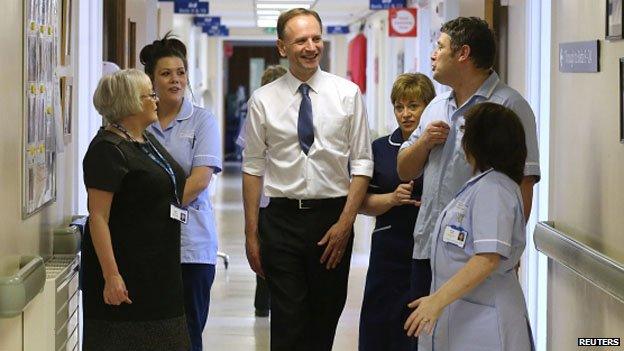
NHS England boss Simon Stevens says efficiency savings can account for £22bn of the service's £30bn shortfall
It's another sign of the power of the head of NHS England Simon Stevens in shaping the political debate over health.
As I wrote over Easter, the £8bn identified by Mr Stevens last autumn as part of his proposed solution to a looming NHS funding gap had generated a mixed response from the leading parties.
Now it has fuelled a heated series of exchanges dominating the campaign debate.
The debate is in essence between "trust us, we can deliver" with a higher long-term spending pledge and a more cautious and funded shorter-run plan.
As always it will be down to voters to assess the arguments either way.
In the end £8bn could prove too small a government top-up for the NHS. The efficiency savings talked about look extremely ambitious and may not be achieved.
And of course there could be unpalatable decisions about even deeper cuts in other Whitehall departments or tax rises to sustain cash injections required by the health service.

UKIP said it had a "fully-funded plan" to put an extra £3bn into the NHS, to be paid for by cutting contributions to the EU and slashing the foreign aid budget.
According to NHS England, if spending increases in line with inflation, there will be a £30bn shortfall in the health service budget by 2020.
Its five-year plan says £22bn of the £30bn could be found through efficiencies and new ways of working.
Subscribe to the BBC Election 2015 newsletter, external to get a round-up of the day's campaign news sent to your inbox every weekday afternoon.
- Published11 April 2015
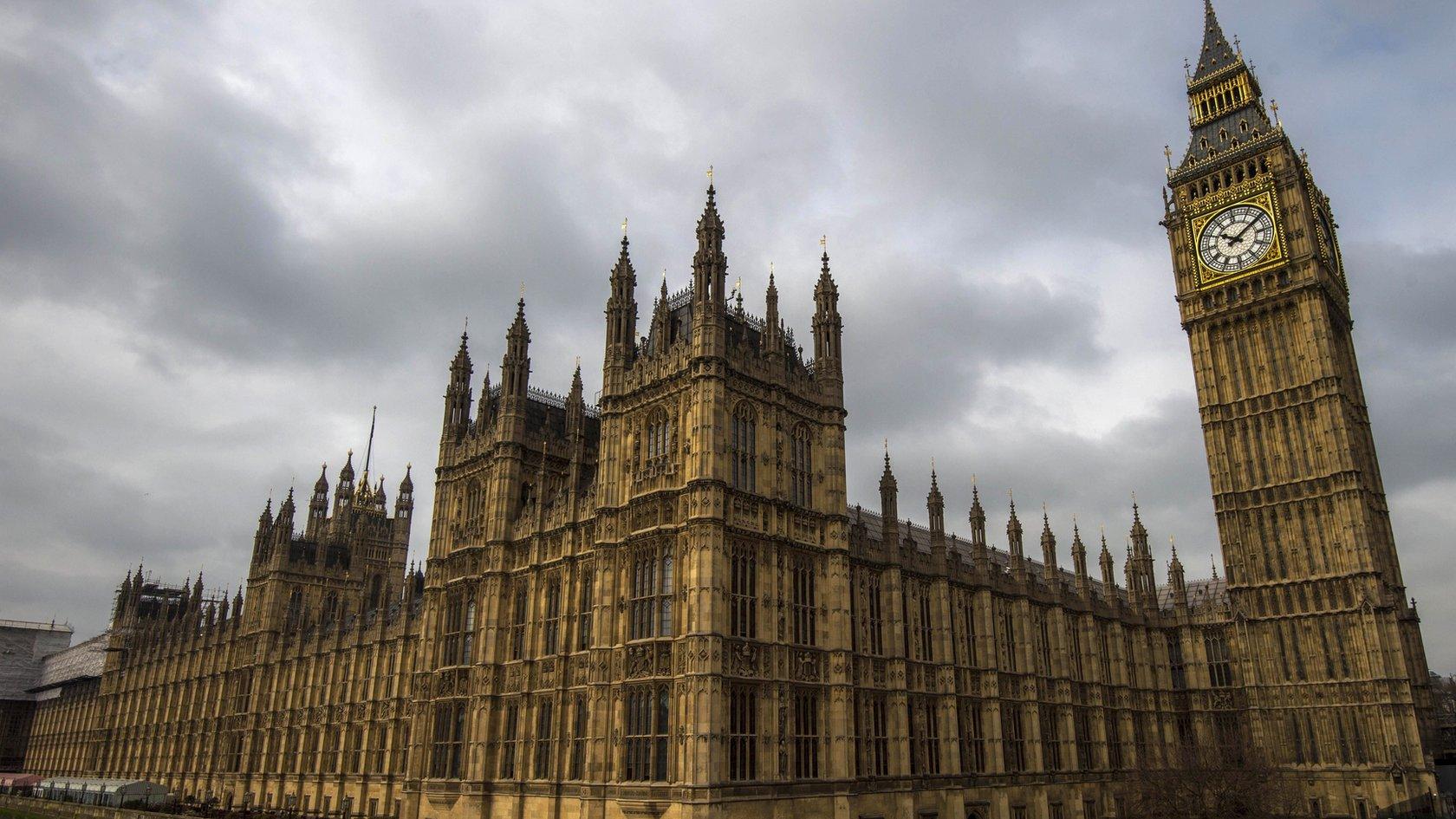
- Published11 April 2015
- Published31 March 2015
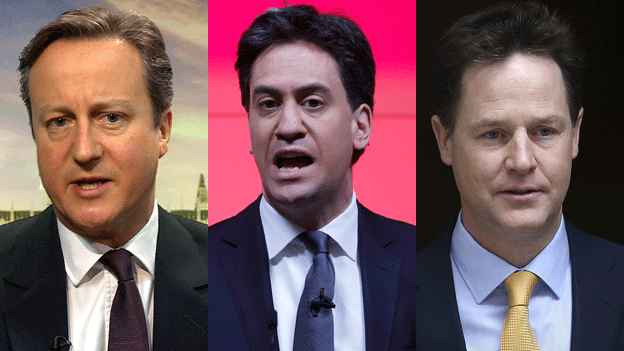
- Published22 September 2014

- Published10 April 2015
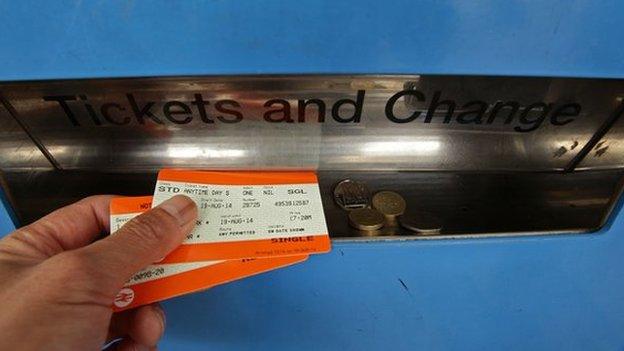
- Published4 April 2015
